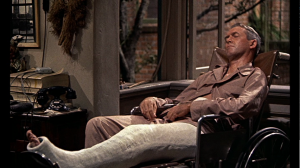People judge others. It is a fact that is prevalent in today’s society and is a theme that is also present in The Girl with the Dragon Tattoo. In this novel, judgment is based off of social status and reputation. Without a good social status, a person’s credibility is ruined.
In the opening chapters of the book, the reader learns of two main characters in the book. One is Mikael Blomkvist, a financial journalist who is facing media pressure after being accused of libel against a prominent financier, Hans-Erik Wennerström. Because of this, Blomkvist’s career and reputation are plummeting quickly. His social status and reputation are ruined and he fears that he will never be able to write again. The second main character, Lisbeth Salander, is in a similar situation. She too has virtually no social standing, and therefore no credibility, because she is a ward of the state. She is called insane and is under strict guardianship enforced by the government. Both Lisbeth and Mikael lack the credibility they need to successfully continue with their lives because they have been shunned by society in one way or another.
On the opposite end of the spectrum, the reader is then introduced to the very prominent Vanger family. Henrik is the eldest of the family and established the corporation that generates wealth for the family. However, each member benefits from the family name. It gives them power, prestige, and a social standing that they may not have had otherwise. Their public credibility is quite large even though we later learn that the corporation is beginning to fail.
However, even though The Girl with the Dragon Tattoo seems to correlate good credibility with a well-known social status, it really just emphasizes that reputations are not always proven true. For example, as the novel progresses we learn of more and more dark secrets in the Vanger family: the death and disappearance of Harriet, the faulty relationships between different members in the family, and most importantly, Martin’s sadistic and murderous behavior. As the residing CEO of Vanger Corporations, Martin’s reputation and social standing are pristine and he is quite powerful in the business world. Clearly, his reputation was not accurate towards who he was and his behavior as a person.
Mikael is also a victim of judgment due to reputation. He did not defend himself against his story about Wennerström and is seen to be a liar with no cause except to create excitement in the business world. However, he too proves his reputation wrong, but instead of losing social status like Martin, he ends up gaining it. His newest publication on the Wennerstöm affair ignites the financial world like wildfire, restores his reputation and the credibility of the Millennium.
The Girl with the Dragon Tattoo is structured so that the reader makes judgements based off of a given character’s social status. It is not until later in the novel where truth is finally revealed. This is similar to judging a person and than realizing their true colors only after knowing and speaking to them for some time. Clearly, although The Girl with the Dragon Tattoo seems to relate credibility to social status, it’s really emphasizing the age-old cliché of “don’t judge a book by its cover”.




 Hitchcock successfully captures our inner desire to peer what others are doing. The Rear Window also reminds me of a film called Dans La Maison I watched earlier this year. It is about a writing teacher who asks his student Claude to observe and record what he saw about one of his classmates. Claude’s description is so fascinating and realistic that the teacher can’t help but keeping reading his assignment just like peering Claude’s classmate in person. What Claude writes offers the teacher another rear window to learn everything that’s going on. A voyeur may take different form to spy on others. But what is the main motivation for voyeurs?
Hitchcock successfully captures our inner desire to peer what others are doing. The Rear Window also reminds me of a film called Dans La Maison I watched earlier this year. It is about a writing teacher who asks his student Claude to observe and record what he saw about one of his classmates. Claude’s description is so fascinating and realistic that the teacher can’t help but keeping reading his assignment just like peering Claude’s classmate in person. What Claude writes offers the teacher another rear window to learn everything that’s going on. A voyeur may take different form to spy on others. But what is the main motivation for voyeurs?


